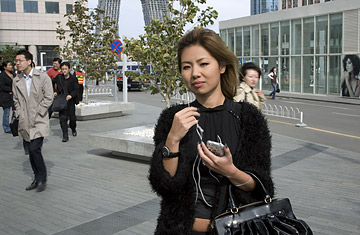
Wendy Ye's customized crystal-encrusted iPhone is at hand as she strolls through Beijing's SoHo district.
"I don't need a man to buy me anything," says Bao Bao Wan, 26, as she caresses her orange Hermès Birkin bag, a recent splurge. Wan, a fine-jewelry designer who splits her time between Beijing and Hong Kong, knows exactly the kind of guy she'd like to meet. "He'll probably have to be Western. Chinese men just don't get women from the new generation."
China's new generation of young women share the same dreams as many of their Western sisters: find a great job, meet a great man. The difference is that many of the more than 200 million young adults under 30 in China today are already experiencing a lifestyle both unattainable and unimaginable to their mothers, who grew up in Mao's China and then started families when Deng Xiaoping launched the one-child policy in 1979. Wan, who can easily command the best private room at a local restaurant, explains the generation gap as her chopsticks hover over the lunchtime dumplings.
"During the Cultural Revolution, my mother was sent to the countryside, and I don't mean Southampton!" says Wan, whose mother had to toil on a farm. Despite their generational divide, Wan says her mother is supportive of her choices. Wan's preferred uniform of skintight leather pants and sleek white shirt unbuttoned to reveal a flash of lacy bra, for example, is a far cry from the Mao jacket her mother had to wear. "If I dress a little bit sexy, she thinks I look beautiful," Wan says. "I'm the youth she didn't have."
While Wan admits she's not an average Beijinger (she was educated in the U.S. and France and now lives part-time in Hong Kong), she says her hometown friends share the same angst experienced by friends in Manhattan. "Chinese girls are not as conservative as you think," she says, laughing. Her life in Beijing is spent forging her career, shopping for luxury goods, partying at private clubs and, of course, trying to meet the right guy.
But China's Me generation also has to prove adept at surfing a culture that's changing at a dizzying speed. While the rise of the Chinese economy is not unexpected, it's happening faster than anyone would have predicted. According to a Credit Suisse study, income among 20-to-29-year-olds grew 34% in the past three years, with a third of the same age group using credit cards—a concept largely foreign to previous generations. And yet the urban dwellers in this demographic don't seem the least bit disoriented by the booming capitalist-within-communist system—a fact that's not lost on European luxury retailers.
"Because China went through a recent dark age, because their mothers didn't have things, this generation is learning afresh," says Fendi ceo Michael Burke, who last fall branded the Great Wall with Fendi's double-F logo and held its first-ever fashion show there, setting the stage for more brand expansion. "They don't have a generation before them to refer to style-wise, so they are daring with the choices they make."